Factors to consider when choosing pet-friendly flooring.
There's a lot to keep in mind when you're a pet owner shopping for the right flooring. Stick to surfaces that will:
- resist scratches from sharp claws
- hold up against wear-and-tear
- be easy to clean and maintain
- withstand water and stains, in case of an accident every now and then.
Once you find flooring that satisfies these factors, the only things left to consider are budget and personal taste. Here are our top seven pet-friendly flooring options:
- vinyl
- tile
- laminate
- engineered hardwood
- bamboo
- poured and sealed concrete
- cork
1. Vinyl flooring: Versatile and cost-efficient.
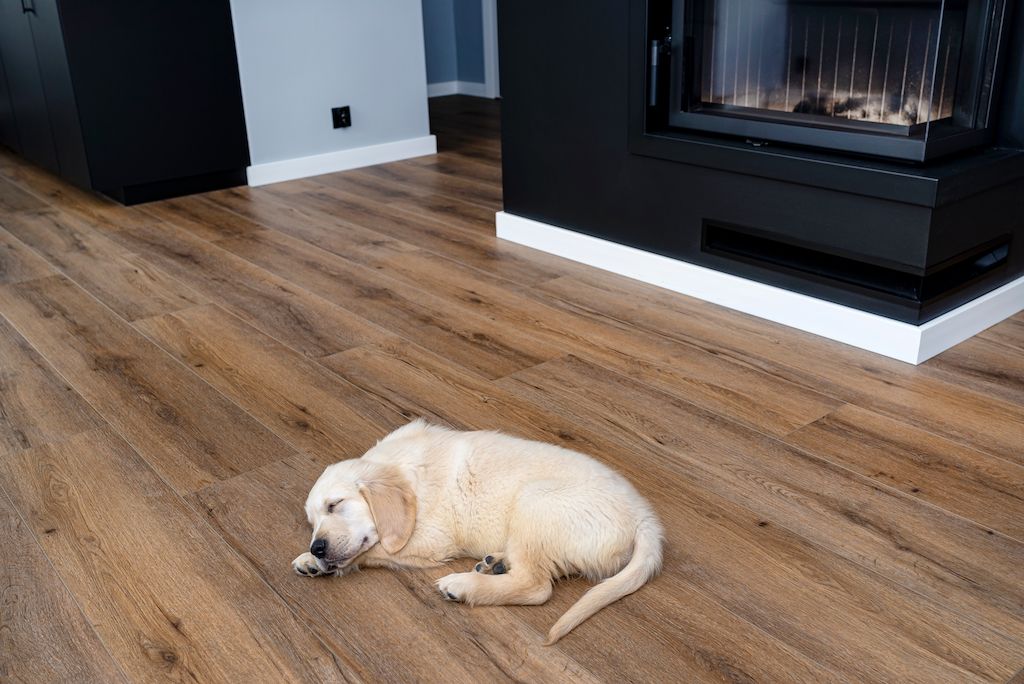 Because vinyl flooring — including luxury vinyl planks and tiles — consists of PVC and multiple layers, it’s waterproof and durable, lasting up to 25 years if you properly maintain it.
Because vinyl flooring — including luxury vinyl planks and tiles — consists of PVC and multiple layers, it’s waterproof and durable, lasting up to 25 years if you properly maintain it.
Plus, luxury vinyl planks are designed to look like real wood (or stone, if you opt for luxury vinyl tiles) but cost a fraction of the price. With a multitude of designs to choose from, it’s a win-win for your pet, your palette and your wallet.
Related: Installing vinyl floors? Here's what you need to know.
2. Tile flooring: durability on a budget.
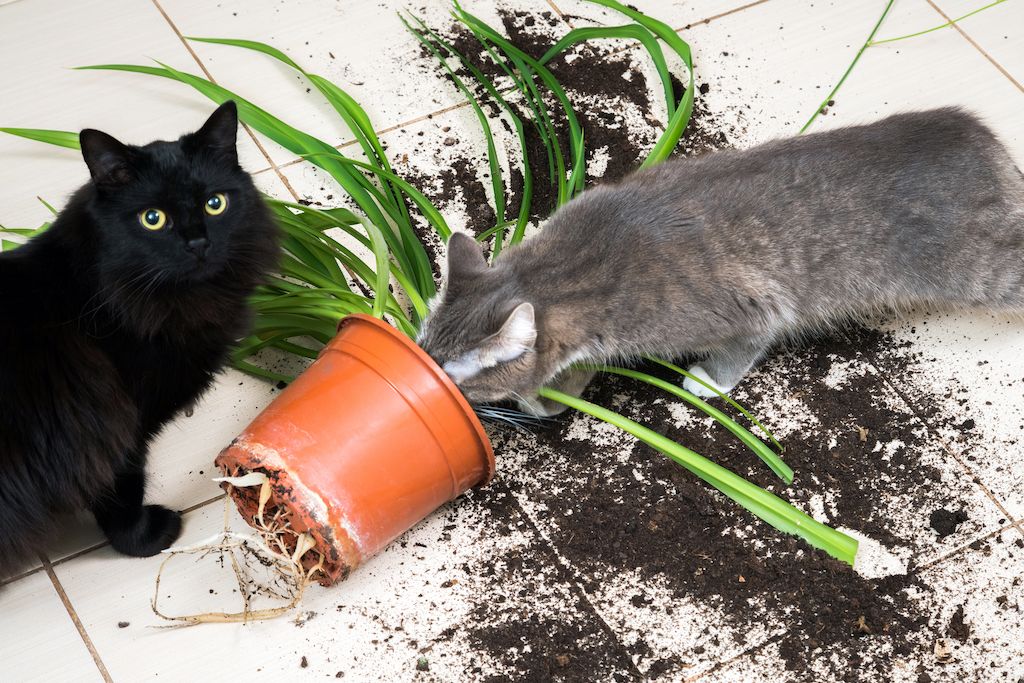 While pricier than vinyl, tile is another great option for doggy or kitty domiciles. Whether you choose ceramic, porcelain or natural stone tile (the priciest of the three options), you’ll have peace of mind knowing that your flooring is:
While pricier than vinyl, tile is another great option for doggy or kitty domiciles. Whether you choose ceramic, porcelain or natural stone tile (the priciest of the three options), you’ll have peace of mind knowing that your flooring is:
- durable (tile can last 75 to 100 years if you maintain it)
- scratch-resistant
- stain-resistant
- moisture-resistant
- fully customizable with different materials, designs and colors
Plus, if you live in a warm climate, your pets will love being able to stretch out on a cool tile floor.
Pro tip: You might not need to seal your tile if it’s ceramic or porcelain, but natural stone usually needs to be sealed. If needed, make sure you seal and clean your grout — and hire a pro for specific cleaning and care instructions.
Related: How to clean your tile floors.
3. Laminate flooring: Value for an active lifestyle.
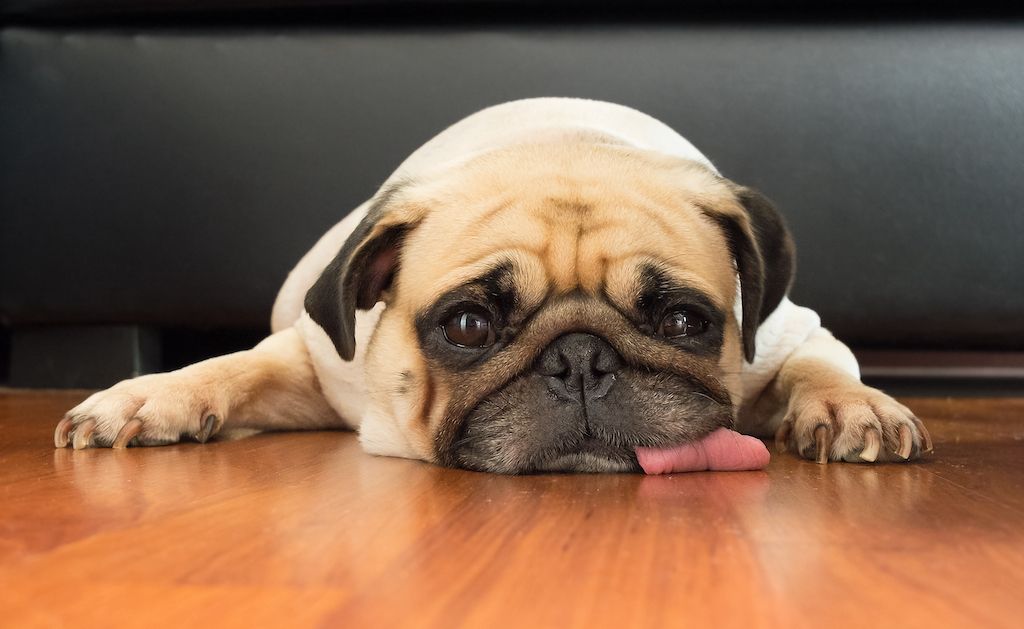 For the most part, the best laminate flooring can stand up to scratches, stains and liquids, though it can warp if exposed to too much moisture — especially standing water.
For the most part, the best laminate flooring can stand up to scratches, stains and liquids, though it can warp if exposed to too much moisture — especially standing water.
However, this type of flooring is relatively affordable and easy to maintain, so it's a great option if you're not looking to spend a lot of money and have an active pet.
Pro tip: If you want your laminate floors to look like real hardwood flooring, consider adding a textured finish.
Related: Laminate vs. vinyl flooring comparison guide.
4. Engineered hardwood: For the solid-wood enthusiast.
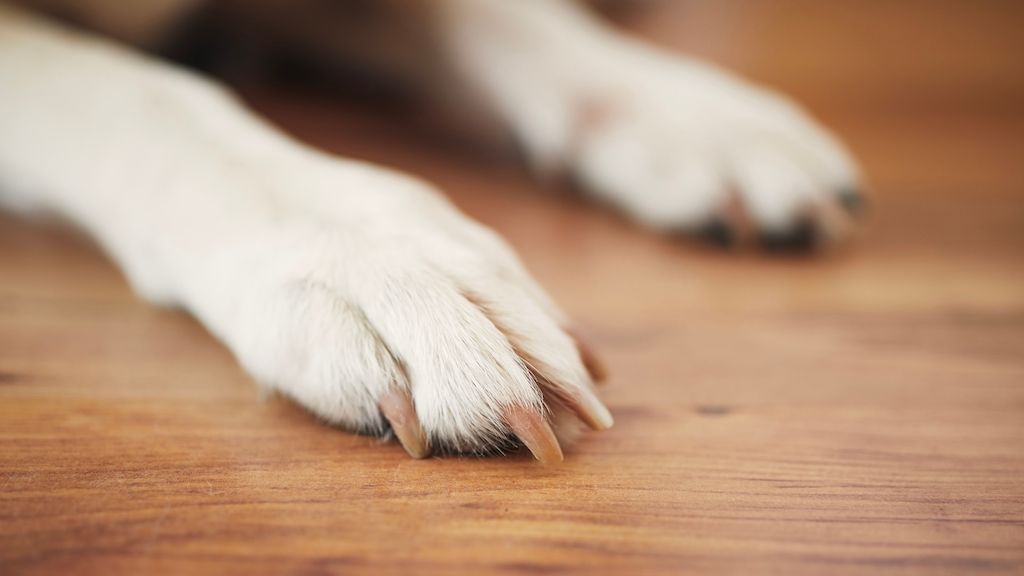 Sure, there’s nothing quite like the genuine article of hardwood flooring, so if you’re set on wood, consider an engineered option. Engineered hardwood is made with a thin layer of natural wood on top, so you'll get the look you want without spending too much.
Sure, there’s nothing quite like the genuine article of hardwood flooring, so if you’re set on wood, consider an engineered option. Engineered hardwood is made with a thin layer of natural wood on top, so you'll get the look you want without spending too much.
Bonus: Engineered wood is relatively durable, and you can add a scratch-resistant finish to protect it. It's not as water-resistant as vinyl or tile, but it’s far better at holding up to humidity than solid wood flooring.
Related: How much does hardwood flooring cost?
See which flooring specialists are top-rated in your area.
Please enter a valid zip code
5. Bamboo flooring: Solid and long-lasting.
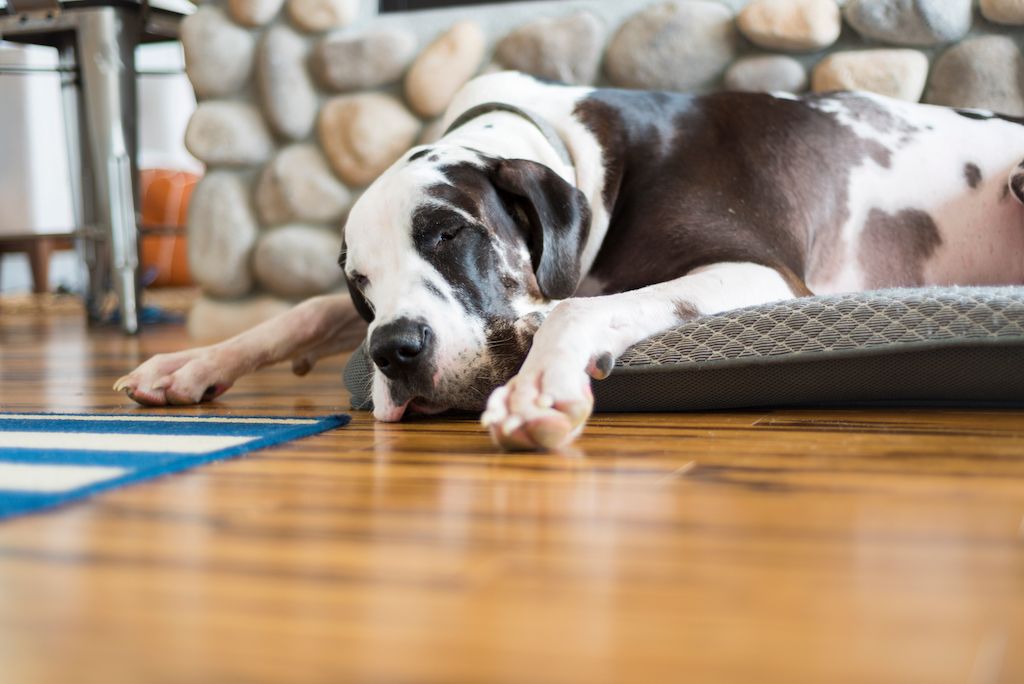 Though not traditional hardwood, bamboo is a sturdy, wood-like alternative that — between the two — wins the durability and stain-resistance game by a mile.
Though not traditional hardwood, bamboo is a sturdy, wood-like alternative that — between the two — wins the durability and stain-resistance game by a mile.
It’s super long-lasting, hitting that 100-year mark, but there are a couple of downsides. Bamboo can behave similarly to hard wood in humid environments, swelling when exposed to moisture. Plus, it’s not totally scratch-resistant, so you might see the occasional scrape from sharp little claws.
If you opt for bamboo, stay on top of maintenance and take steps to protect your floors from dents and scratches, especially in areas your pet loves to scamper and scurry.
Related: How much does it cost to install bamboo flooring?
6. Poured and sealed concrete: tougher than nails.
 The industrial vibe is very in, so if you’re a fan of this look, consider concrete flooring. Concrete is easy to clean, scratch-resistant, stain-resistant and generally pretty difficult to damage. Like tile, concrete is great in warm climates where your furry friends may frequently need to cool off — and it’s typically more affordable than wood options.
The industrial vibe is very in, so if you’re a fan of this look, consider concrete flooring. Concrete is easy to clean, scratch-resistant, stain-resistant and generally pretty difficult to damage. Like tile, concrete is great in warm climates where your furry friends may frequently need to cool off — and it’s typically more affordable than wood options.
The cons: You might need to seal your concrete floors every couple of years to properly maintain them. Concrete flooring can also be cold on bare feet, though installing radiant heating is always an option.
Related: How much does concrete cost?
7. Cork flooring: Quiet and comfy.
 Like bamboo, cork flooring can add warmth and style to any space. It’s sound-absorbent, anti-slip and cushy, so it can be a great solution for older pets with weaker joints.
Like bamboo, cork flooring can add warmth and style to any space. It’s sound-absorbent, anti-slip and cushy, so it can be a great solution for older pets with weaker joints.
The biggest drawback: Cork isn't scratch-resistant, so you’ll need to keep your pet's nails trimmed. It's also vulnerable to sun exposure, meaning the color might change over time.
Related: How much does flooring installation cost?
Compare prices from flooring specialists near you.
Please enter a valid zip code
Use Thumbtack to install pet-friendly flooring.
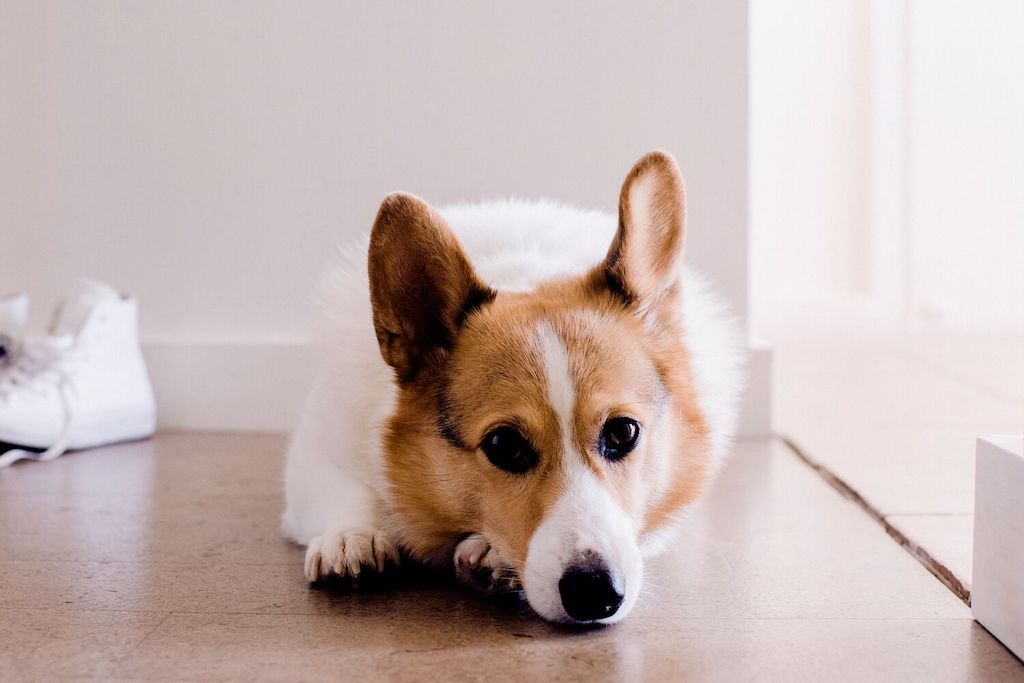 If you’re ready to install pet-friendly flooring in your home, use Thumbtack to find flooring contractors and installation professionals near you.
If you’re ready to install pet-friendly flooring in your home, use Thumbtack to find flooring contractors and installation professionals near you.
FAQs
What are the best hardwood floors for dogs?
The best types of hardwood flooring for dogs should be hard enough to resist scratching and dents. This includes Brazilian walnut, hickory, maple and red oak. Scratches are more noticeable on glossy, shiny finishes, so consider choosing a satin or matte finish instead.
Related: These are the best types of hardwood flooring.
What kind of floor is best for dog pee?
Tile (ceramic or porcelain) and vinyl are some of the best flooring options that can resist stains and damage from dog urine.
What is the most durable flooring for dogs?
Luxury vinyl and tile are the most durable flooring options for dogs. In addition to being strong, these materials are versatile in terms of patterns and colors, so you can find one that suits your space and your taste.
Which flooring is more scratch-resistant?
Tile, luxury vinyl and some hardwoods are scratch-resistant options if you have pets. Concrete is also a good choice.
Do dogs ruin wood floors?
Unlike other manufactured surfaces, hardwood floors are more susceptible to warping and staining from water damage. So if your dog is having a hard time with potty training, it might not be the best option.
Many softwoods (like pine) aren’t as scratch-resistant as other flooring options, but there are steps you can take to make sure your dog won't ruin your wood floors. Add a scratch-resistant finish, clean up potty accidents right away and choose the hardest wood you can find — like Brazilian walnut or maple.
Will dogs ruin laminate flooring?
Most laminate flooring is water-resistant, not waterproof. So if you're still working on housebreaking your puppy, laminate might not be the way to go.
If you do choose laminate, try a textured instead of glossy finish. This way, scratches and damage won't be as obvious to the naked eye.
What is better for dogs: Laminate or hardwood?
It depends on which factors are most important to you. Consider the following comparison:
Laminate is better for:
- Affordability
- Scratch-resistance
- Ease of installation
Hardwood is better for:
- Appearance
- Life expectancy
- Ease of repair
Are hard floors bad for dogs?
Hard, sleek and smooth floors can pose potential risks for our four-legged friends. Though these surfaces are easy to clean and look great, they may cause your pet to slip and slide. For older pets, this could be dangerous.
Get free estimates from top-rated flooring specialists.
Please enter a valid zip code